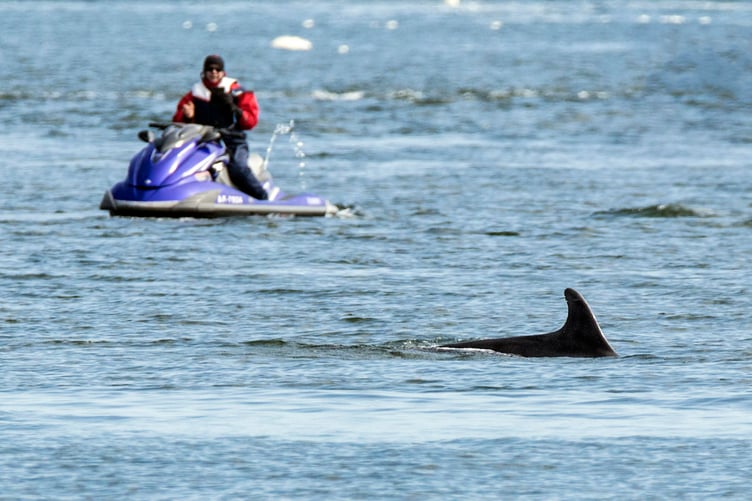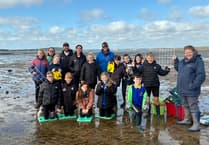Changes to the regulations around jet ski use are a timely reminder to holiday makers and recreational water users to act responsibly around wildlife, or risk potential legal action.
As more people are visiting the coast and enjoying taking to the water, the potential of harm to whales and dolphins is growing, especially at peak holiday times. The new jet ski legislation grants more powers to prosecute people for the dangerous misuse of such watercraft, misuse that can have lethal impacts on marine wildlife.
Whale and Dolphin Conservation (WDC) has been working to raise awareness of and reduce this threat, providing advice to members of the public on what not to do when in the water near whales, dolphins and porpoises, and what signs to look out for if they are disturbed.
For many people, encountering whales and dolphins whilst on the water is an amazing experience, but incidents of disturbance are increasing and many water users on jet skis, paddleboards or in kayaks simply do not know what the rules are or how to report incidents they do witness.
Reports of jet ski incidents in Wales have included a disturbance of sea birds at a nature reserve near South Stack, Anglesey, and a reported case of dolphin being disturbed in Cardigan Bay. Volunteers with WDC’s Shorewatch citizen science programme who have been recording the presence of whales and dolphins at sites around the shore for over a decade, now also collect data on disturbance to better understand where these incidents are happening in Scotland.
“UK seas are a special place for dolphins and whales, being home to more than 20 species, more than anywhere else in northern Europe”, said Dr Carla Boreham, director of campaigns and policy.“A good encounter is one that is enjoyable for you and does not harm the whales or dolphins.”
“Whilst the new law changes around jet ski use are welcomed, we are calling for disturbance of marine mammals to become a notifiable offence in England and Wales so that official Home Office records are kept of these offences, enabling better understanding over time of problem hotspots and where to direct police resources.”
Mark Harrison, Detective Sgt, National Wildlife Crime Unit (NWCU) said:“As the holiday season gets underway, more people will be heading to our coastline to enjoy the beaches, the scenery and the wildlife.
“It is great to see people getting outside and connecting with nature but it is important to remember that wildlife needs space. By intruding, getting too close and disturbing whales, dolphins and other marine wildlife, people could affect the health of these creatures, preventing them from eating, breeding and raising their young. I would rather prevent a crime than investigate one.”
All suspected cases of disturbance should be reported to the police on 101. Tell the operator that you are reporting a wildlife crime and ask for an incident number to ensure that reports can be tracked. Provide as much information as possible, including:
- the date, time and location of the disturbance
- the behaviour of any vessels and of the whales and dolphins before, during and after the event
- if possible, the species involved
- the duration of the interaction
- any identifying features of the people or vessel involved, such as the boat name and the clothes worn.
Local operators and other organisations working closely with the Pembrokeshire Coast National Park Authority and the RSPB have produced the Pembrokeshire Marine Code to help protect the flora and fauna of the county. The Marine Code teaches you how to plan ahead, keep your distance, reduce speed and noise, and view wildlife.
Visit the Pembrokeshire Marine Code website for codes of conduct concerning seabirds, seals and cetaceans (dolphins, porpoise and whales)
The uk.whales website has plenty of advice on enjoying the water without disturbing the wildlife, including the following tip:
“You might think it’s just noisy boats and jet skis that are a problem, but kayakers and paddle-boarders can disturb dolphins too.
“Whales, dolphins and porpoises need to feed, rest, socialise and reproduce to stay healthy and to keep their populations strong. If you get too close to these activities and disrupt their natural behaviour, you might unwittingly cause changes to an individual's breathing, hamper their ability to feed or stop them getting the rest that they need. Mothers with calves are particularly vulnerable.
“Human disturbance can even drive whales and dolphins away from the places that are important to them. This disturbance is made worse by repetition and it is increasing as more people head out onto the water.”





Comments
This article has no comments yet. Be the first to leave a comment.